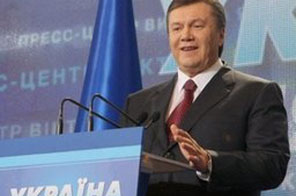Pro-Russia candidate leads in Ukraine election
KIEV: Russia-friendly politician Viktor Yanukovich was on course Monday to win Ukraine's presidential election, partial results showed, in a stinging rebuke to leaders of the 2004 Orange Revolution.
Yanukovich had 49.6 percent of the vote while his opponent, Prime Minister Yulia Tymoshenko, had 44.7 percent, the Central Elections Commission said, based on results from 52 percent of polling stations.
Another 4.5 percent of ballots were cast for the "against all" option in Sunday's hard-fought election in Ukraine, an ex-Soviet republic strategically located between Russia and the European Union.
The results pointed to a stunning comeback for Yanukovich, who was poised to grab the presidency in 2004 before the Orange uprising swept him aside and brought a pro-Western government to power.
Exit polls forecast that Yanukovich would win with a lead of three to five percent over Tymoshenko, a charismatic politician who championed EU integration during her campaign and was a key leader of the Orange Revolution.
Profile: Viktor Yanukovich
Turnout was heavy across the country at 69 percent, the Central Elections Commission said.
In a victory speech at his campaign headquarters late Sunday evening, Yanukovich said the election had opened a "new page" in the history of Ukraine and reached out to Tymoshenko supporters after a divisive campaign.
"I will do everything to ensure that citizens of Ukraine -- irrespective of where in the country they live -- feel comfortable and calm in a stable country," he said in a nod to the country's geographic divisions.
Ukraine is split between a Russian-speaking east, which is Yanukovich's stronghold, and a nationalist Ukrainian-speaking west that went strongly for Tymoshenko.
Tymoshenko, who had accused the Yanukovich camp of plotting to rig the vote, dismissed the exit polls indicating she would lose and said only the final results mattered.
Profile: Yulia Tymoshenko
"So long as the last count is not made, it is impossible to talk about any kind of results," a defiant Tymoshenko told reporters, dramatically dressed in a cream-coloured outfit and with her trademark golden hair braid.
Tymoshenko's right-hand man, Deputy Prime Minister Olexander Turchynov, spoke of "extensive falsifications".
Tymoshenko had previously vowed her supporters would protest on the streets if she detected fraud by her rival.
Yanukovich's campaign seemed ready to counter that threat, however, setting up dozens of tents and sending hundreds of supporters around key official buildings in Kiev.
A senior interior ministry official, Volodymyr Mayevski, said Yanukovich had made a request for a gathering of 50,000 people in Kiev.
The Orange Revolution broke out after Yanukovich was declared the winner of a disputed presidential election in 2004. Tens of thousands poured into the streets to protest vote fraud and Kremlin meddling in the election. Related article: Anger and broken dreams as Ukraine votes
After the protests, Ukraine's supreme court threw out Yanukovich's victory as fraudulent and ordered a repeat election, which he lost to pro-Western President Viktor Yushchenko.
But Ukrainians grew frustrated as Yushchenko seemed incapable of running the country, let alone realising ambitious dreams of bringing Ukraine into NATO and the European Union.
He squabbled repeatedly with Tymoshenko and the government seemed unable to cope with a devastating economic crisis that saw Ukraine's GDP plunge 15 percent last year.
Yushchenko was eliminated in first-round presidential polls in January where he got less than six percent of the vote.
During the campaign Tymoshenko pledged to redouble efforts to bring Ukraine into the EU, although she also has close ties with Russian Prime Minister Vladimir Putin and was seen as palatable to Moscow.
Yanukovich, who is far less charismatic than Tymoshenko and drew ridicule for his inarticulate speech, distanced himself from Moscow somewhat and sought help from US political consultants to improve his image.
However controversy remained over his criminal record, which includes convictions for theft and assault in the Soviet era that were erased by the courts in 1978.






